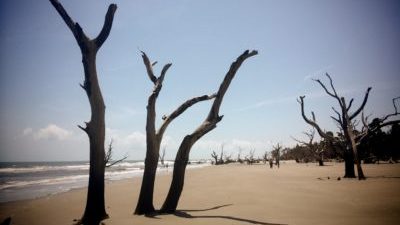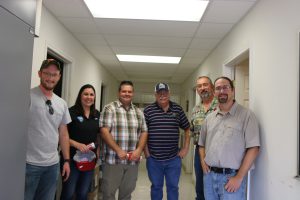Supporting Native and Indigenous Community Climate Adaptation Efforts

For centuries, Native Americans, Alaska Natives, Native Hawaiians, Pacific Islanders, and other Indigenous peoples have stewarded natural resources to sustain their communities, traditional ways of life, and cultural identities. This close relationship with the natural world puts Indigenous communities at the forefront of climate change impacts. Drawing upon a strong history of adaptation and innovation, Tribal nations and Indigenous communities are key collaborators on adaptation work within the Climate Adaptation Science Center (CASC) network. The CASCs partner with Native and Indigenous communities to better understand their specific knowledge of and exposure to climate change impacts, to increase or assist with capacity to support adaptation planning, and to identify and address their climate science needs. The CASCs have funded, organized, and participated in a variety of research projects, training workshops, and stakeholder meetings.
Engaging Tribal Environmental/Natural Resources Staff in the Southeast
 Through in-person visits and virtual presentations, the Southeast CASC is engaging Tribal environmental and natural resources staff to identify the information and technical support needs of regional Tribal nations. Located within the Southeast CASC footprint are six federally recognized Tribal nations, and many state-recognized Indigenous communities. In 2018, the Southeast CASC presented the latest science on climate change in the region at the Institute for Tribal Environmental Professionals Climate Adaptation workshop hosted by the Mississippi Band of Choctaw Indians. The CASC also implemented a Climate Adaptation Science Field Intensive for graduate students, which included an introduction to working with regional Tribal nations. The training included principles and ethics of Tribal engagement and field visits with natural resource managers from the Eastern Band of Cherokee Indians, who taught students about the climate change challenges they face and strategies they are using to adapt. These place-based learning opportunities provide grounding for additional engagement with Eastern Band of Cherokee and other Tribal partners in the region.
Through in-person visits and virtual presentations, the Southeast CASC is engaging Tribal environmental and natural resources staff to identify the information and technical support needs of regional Tribal nations. Located within the Southeast CASC footprint are six federally recognized Tribal nations, and many state-recognized Indigenous communities. In 2018, the Southeast CASC presented the latest science on climate change in the region at the Institute for Tribal Environmental Professionals Climate Adaptation workshop hosted by the Mississippi Band of Choctaw Indians. The CASC also implemented a Climate Adaptation Science Field Intensive for graduate students, which included an introduction to working with regional Tribal nations. The training included principles and ethics of Tribal engagement and field visits with natural resource managers from the Eastern Band of Cherokee Indians, who taught students about the climate change challenges they face and strategies they are using to adapt. These place-based learning opportunities provide grounding for additional engagement with Eastern Band of Cherokee and other Tribal partners in the region.
See detail of Tribal support activities at other CASCs on the NCASC website.
News from the Tribal Resilience Liaisons
Tribal and Indigenous communities face significant challenges in responding to climate change. The Bureau of Indian Affairs, the U.S. Geological Survey, and Tribal organizations have collaborated to station Tribal Resilience Liaisons at the regional Climate Adaptation Science Centers (CASCs). The Liaisons are typically employed by Tribal organizations and work at CASCs, and aim to increase the resources available to (1) help Tribes access information, data, and expertise at the CASCs and elsewhere; (2) facilitate research integrating traditional knowledge; and (3) support Tribal forums and information exchange. These efforts are designed to better understand, communicate, and meet the needs of Tribes through partnerships to promote more resilient Tribal communities.
Casey Thornbrugh, Northeast and Southeast CASCs
Casey Thornbrugh is a citizen of the Mashpee Wampanoag Tribe and is employed by the United South and Eastern Tribes (USET) as the Tribal Resilience Liaison for the Northeast and Southeast CASCs. Casey’s Ph.D. research focused on investigating climate teleconnections and North American precipitation variability and working with Tribal communities to develop culturally responsive climate science curricula for teaching students in Tribal Colleges and K-12 schools.
Casey Thornbrugh serves as the Tribal Climate Science Liaison for the United South and Eastern Tribes (USET) and works with the Northeast and Southeast CASCs. A current focal point of his work is assisting Tribal nations to complete Climate Adaptation Plans. Tribal departments working on these plans often can only designate one or two staff to complete the final drafts due to the multiple priorities and the workload Tribal departments often have. This year, at the request of environmental staff from Tribal nations in Maine, Casey arranged a three day “climate adaptation plan writing retreat.” This retreat was a small cohort of Tribal staff from the Passamaquoddy Tribe-Pleasant Point, Aroostook Band of Micmacs, Houlton Band of Maliseet Indians, and the Wampanoag Tribe of Gay Head (who were also supported by their Tribal department to travel to Maine for support). A quiet space was provided by the Maine Indian Education and Wabanaki Culture Center in Calais, Maine. Casey attended the writing retreat to provide comments and feedback on the draft plans while participants assisted each other by providing feedback and suggestions. The success of this writing retreat has motivated Casey to plan future writing retreats for Tribal nations in the Northeast and Southeast regions.
Contact: cthornbrugh@usetinc.org
Read more about the Tribal Liaisons at other CASCs and some of their recent activities.
- Categories:
